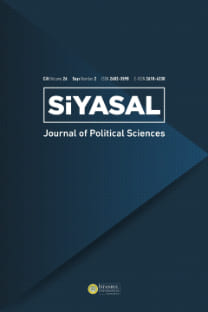Devrim Sonrası İran'da Siyaset: Aktörler, Stratejiler ve Gelecek
Öz
Anahtar Kelimeler:
İran, siyaset, mücadelesi, Reformcular, Muhafazakârlar
___
Abrahamian, Ervand, Humeynizm: İslam Cumhuriyeti Üzerine Denemeler,. Metis Yayınları, 2002, s.109.• Afshari, Ali ve H. G. Underwood , “The Student Movement’s Struggle,” Journal of Democracy 18.4 (2007) 80-94
• Aktaş, Cihan, Dünün Devrimcileri Bugünün Reformcuları: İran’da Siyasal, Kültürel ve Toplumsal Değişim, İstanbul, Kapı Yayınları, 2004.
• Boroujerdi, Mehrzad, Iranian Intellectuals and the West: Tne Tormented Triumph of Nativism. New York: Syracuse University Press, 1996.
• Boroumand, Ladan, “Iran’s Peculiar Election,” Journal of Democracy Volume 16, Number 4 (October 2005): 52-63
• Boroumand, Ladan, “The Untold Story of the Fight for Human Rights” Journal of Democracy Vol.18., No:4 (2007) 64-79
• Çakır, Ruşen ve F. Çalmuk,, Recep Tayyip Erdoğan: Bir Dönüşüm Öyküsü. İstanbul, Metis Yayınları, 2001,.
• Ehsani, Kaveh, “Iran: The Populist Threat to Democracy” Middle East Report 241 (Winter 2006). Elektronik versiyonu için bkz., http://www.merip.org/mer/mer241/ehsani.html.
• Ehteshami , Anoushiravan, After Khomeini: The Iranian Second Republic. London and New York, Routledge, 1995
• Ertuğrul, Doğan, (Yazı Dizisi), “Değişen İran-3”, Radikal Gazetesi, 26 Ocak 2007.
• Farhi, Farideh, “Iran's “Security Outlook,” Middle East Report Online, July 9, 2007, http://www.merip.org/mero/mero070907.html.
• Farzin Vahdat, “Post-revolutionary Discourses of Mohammad Mojtahed Shabestari and Mohsen Kadivar: Re-conciling the Terms of Mediated Subjectivity. Part II: Mohsen Kadivar” Critique 17 (Fall 2000): 135-157.
• Fathi, Nazila, “Blacksmith’s Son Emphasized His Modest Roots,” New York Times, 26 June 2005.
• Ganji, Akbar, “The struggle against sultanism,” Journal of Democracy, 16 (4), 2004, pp.38-51.
• Hamaney, Ali, “ABD ile husumet ebediyen sürmez.” Birgün Gazetesi, 4 Ocak 2008.
• Hendleman-Baayur, Liora, "Promises and Perils of Weblogistan: Online Personal Journals and the Islamic Republic of Iran," Middle East Review of
Courts and Politics in Iran and Turkey” International Journal of Middle East Studies 36 (2004; 253-27International Affairs 11 (Haziran 2007). http://meria.idc.ac.il/journal/2007/issue2/jv11no2a6.html.
• Jalaeipour, Hamidreza, “Iran's Islamic Revolution: Achievements and Failures,” Critique: Critical Middle Eastern Studies, Vol. 15, No:3 (Fall 2006); 207-215; 212.
• Karshenas, Massoud ve H. Hakimian, “Oil, Economic Diversification and the Democratic Process in Iran,” Iranian Studies, Vol. 38, No. 1, (March 2005): 67-90.
• Keddie, Nikki R, Modern Iran : Roots and Results of Revolution, New Haven, Yale University Press, 2003.
• Khosrokhavar, Farhad “Postrevolutionary Iran and The New Social Movements”, Eric Hooglund (ed.), Twenty Years of Islamic Revolution: Political and Social Transition in Iran since 1979, Syracuse, Syracuse University
• Maljoo, Mohammad, , “Worker Protest in the Age of Ahmadinejad,” Middle East Report (Winter 241), elektronik ortamda: http://www.merip.org/mer/mer241/maljoo.html
• Menashri, David, Post-Revolutionary Politics in Iran: Religion, Society and Power. London, Frank Cass, 2001,
• Mir-Hosseini, Ziba, “Is Time on Iranian Women Protesters’ Side?”, June 16, 2006, http://www.merip.org/mero/mero061606.html
• Moslem, Mehdi, “The State and Factional Politics in the Islamic Republic of Iran”, Eric Hooglund (ed.), Twenty Years of Islamic Revolution: Political and Social Transition in Iran since 1979, Syracuse, Syracuse University Press, 2002, 19,-35.
• Nasr, Vali, “Rise of ‘Muslim Democracy,’” Journal of Democracy 16-2 (2005): 13-27.
• Nasr ,Vali, “The Conservative Wave rols on,” Journal of Democracy, Vol.16, No:4 (October 2005); 9-25
• O’Donnel, Guillermo, P., Schmitter, ve L. Whitehead (eds.), Transitions from Authoritarian Rule (Dört cilt), Baltimore, John Hopkins University Press, 1986.
• Oğuz, Sami, ve R. Çakır, Hatemi’nin İran’ı. İstanbul, İletişim Yayınları, 2000
• Oğuz, Sami (Hazırlayan), Gülümseyen İslam: Hatemi’nin Ağzından İran’da Değişim, İstanbul, Metis Yayınları, 2001. (Çeviren: Naila H. Nejad)
• Paya, Ali ve M. A. Ghaneirad, “Habermas and Iranian Intellectuals,” Iranian Studies, Vol.40, number 3, June 2007, 305-334.
• Potter, David, “Explaining Democratization,” in Potter, David, D. Goldblatt, M. Kiloh, P. Lewis (et al.), Democratization, Cambridge, Polity Press,
• Razavi-Faqih, Saeed, “Our Letter to Khatami Was a Farewell”(15 Temmuz, 2003) Middle East Report Online, http://www.merip.org/mero/mero071503.html
• Rueschemeyer, Dietrich , E., Stephens, ve J., Stephens, Capitalist Developmenet and Democracy, Cambridge, Polity Pres, 1992.
• Saeidi, Ali A., “The accountability of para-governmental organizations (bonyads): the case of Iranian foundations,” Iranian Studies, Vol. 37, No:3, (September 2004): 479-498
• Shekarloo, Mahsa, “Iranian Women Take On the Constitution”, Middle East Report Online (MERO), July 21, 2005, http://www.merip.org/mero/mero072105.html
• Sazegara, Mohsen, “What ‘we’ should do now?” Journal of Democracy Volume 16, Number 4 (October 2005):64-74
Shain, Yossi, ve J. Linz, Between States: Interim Governments and Democratic Transition, Cambridge, Cambridge University Press, 1995.
• Shambayati, Hootan, “A Tale of Two Mayors: Courts and Politics in Iran and Turkey” International Journal of Middle East Studies 36 (2004; 253-275).
• Taşkın,Yüksel, “Türkiye’de sınıfsal yeniden yapılanma, AKP ve Muhafazakar Popülizm” Birikim 204 (Nisan 2006): 16-26.
• Tezcür,Güneş M., T. Azadarmaki ve M. Bahar, “Religious Participation among Muslims: Iranian Exceptionalism” Critique: Critical Middle Eastern Studies, Vol. 15, No. 3 (Fall 2006); 217–232.
• Vahdat, Farzin, , “Post-revolutionary Discourses of Mohammad Mojtahed Shabestari and Mohsen Kadivar: Re-conciling the Terms of Mediated Subjectivity. Part I: Mojtahed Shabestari,” Critique 16 (Spring 2000): 31-54.
• Volpi , Frederic, “Pseudo-democracy in the Muslim world,” Third World Quarterly 25-6 (2004): 1061–1078.
- ISSN: 1303-1260
- Yayın Aralığı: Yılda 2 Sayı
- Yayıncı: İstanbul Üniversitesi
Sayıdaki Diğer Makaleler
SOSYO-EKONOMİK DEĞİŞME VE SİYASAL KATILMA: KAHRAMANMARAŞ ÖRNEĞİ 1950–2002
Suriye Arap Milliyetçiliğinde Vatan ve Suriyelilik (1919-1939)
Değer Temelli Pazarlama Anlayışında Balanced Scorecard'ın Stratejik Önemi
Para Politikalarının Banka Kredi Kanalı Üzerindeki Etkileri
Nejla AKLAN, Mehmet NARGELEÇEKENLER
ORTADOĞU SİYASETİ VE TOPLUMLARINI ANLAMA YOLLARI
TÜRKİYE’DE BELEDİYELERİN BORÇLANMA SÜRECİ: 1960-2006
TÜRKİYE’DE DÖVİZ KURU KANALININ İŞLEYİŞİ: VAR MODELİ İLE BİR ANALİZ
Seyfettin ERDOĞAN, Durmuş YILDIRIM
KÜRESEL İKLİM DEĞİŞİKLİĞİ SÜRECİNDE SU YÖNETİMİ
Ortadoğu'da Kadın Hareketleri: Farklı Yollar, Farklı Stratejiler
